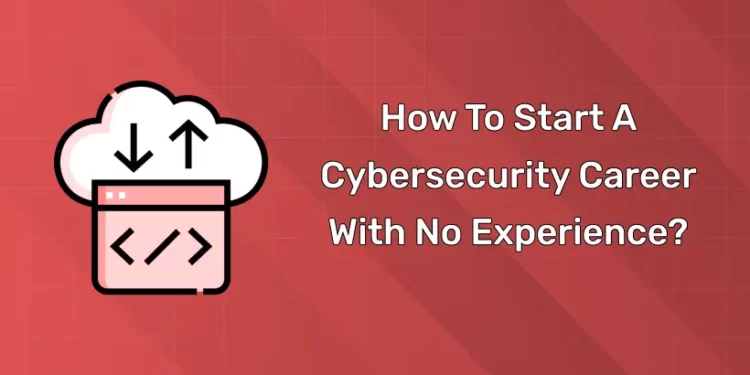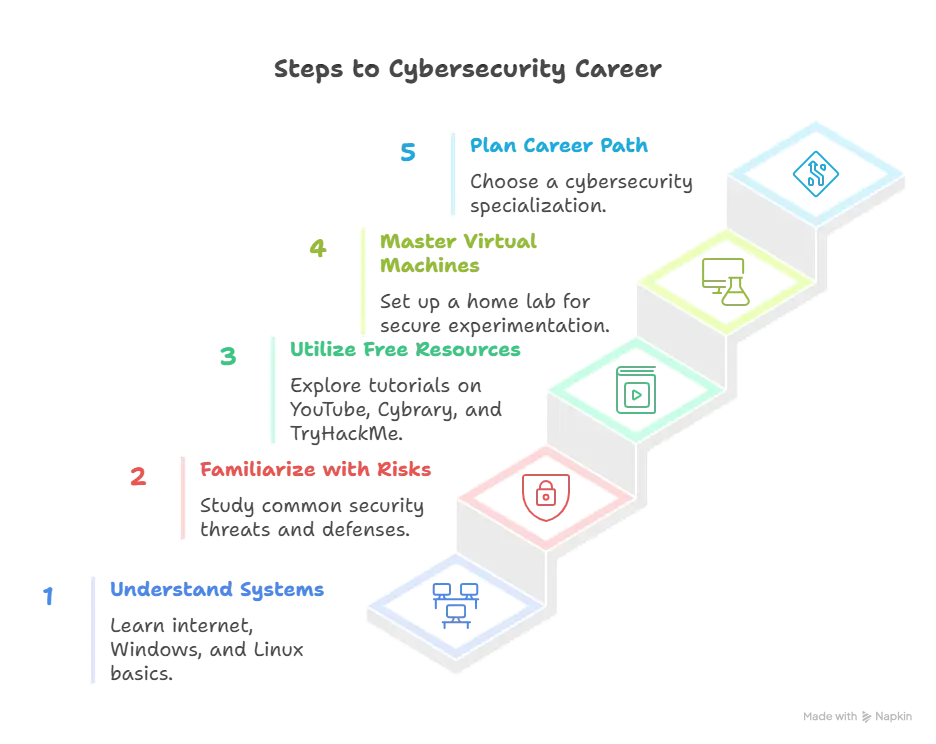Table of Contents
Nearly every day, data breaches, ransomware attacks, and other forms of cybercrime are generating headlines in the society we live in today, which centers on digital technology. As a result of the fact that people, businesses, and even governments are seeking methods to protect themselves while using the internet, there has been a significant increase in the need for cybersecurity specialists. If you are beginning from scratch and have no past expertise in the field of technology or security, what are your options? One of the few industries in which enthusiasm, problem-solving abilities, and continual learning might count more than a conventional background is cybersecurity. What’s nice is that cybersecurity is one of the few fields that can do this. Making a name for yourself in the cybersecurity sector is quite feasible, regardless of your background—student, job switcher, or just tech-inclined. To succeed, all you need is a well-defined objective, the appropriate abilities, and the determination to put in the necessary effort. This article will explain why cybersecurity is a fantastic career option, what to do first, what skills and certifications are helpful for beginners, and how to overcome typical roadblocks.
Enhance your data science skills with us! Join our free demo today!
Why Is Cybersecurity a Great Career Choice for Beginners?
Newcomers with interest and a desire to learn are welcome in the fascinating and rapidly expanding sector of cybersecurity. It’s one of the few professions where you don’t necessarily need years of expertise or a technical degree to get started, and it offers lots of growth prospects, strong demand, and decent pay. Cybersecurity has a lot of opportunities for people who are just starting out. It is one of the IT fields that is growing the fastest. This is why it’s a good choice for beginners:
- Strong Need All Over the World
No matter how big or small a business is, it needs to protect itself from online threats. This need creates a steady stream of job opportunities, even for new workers.
- Professional growth and the ability to adapt
There are many job options in this field, such as security researcher, penetration tester, and cloud security expert. After starting out small, newbies may move on to more specialized jobs as they gain experience.
- Having a good chance of making money
If you’re just starting out in your work, hacking may be a good way to make money because even entry-level jobs can pay well compared to other companies.
- Not a Hard Barrier to Entry
Many companies value skills and training as much as or even more than traditional degrees. It’s easier for new college grads or people who are switching jobs to get in.
- An Intentional Job
Cybersecurity experts are needed to protect people’s data, companies’ data, and even the assets of the country. This makes the job more interesting and gives beginners ideas.
- Education and excitement all the time
Cybersecurity is an area that is always changing because of new threats and better technology. If you like to learn new things and solve problems, you won’t find it boring.
What Are the First Steps to Start a Cybersecurity Career?
If you break it down into smaller, more manageable phases, being an expert in cybersecurity may seem to be a great leap of faith; nevertheless, it is really rather simple to achieve. Instead of focusing on developing a strong foundation, you should concentrate on polishing your abilities. What are some essential first steps?
- Learn how the internet, Windows, and Linux function before moving on to learning about networks.
- Get familiar with common security risks, such as firewalls, encryption, malware, and other methods.
- Make use of the available free educational materials. Beginner-friendly tutorials may be found on YouTube, Cybrary, and TryHackMe at various stages.
- Become proficient in virtual machines and learn how to set up a home lab so that you may examine real-world occurrences in a secure manner.
- Job planning for the future is quite important. Ethical hacking (red), risk management and compliance (green), and system security (blue) are the teams that you might potentially join.
Which Skills Do I Need to Break into Cybersecurity?
The capacity to hack, protect systems, recognize problems before they do damage, and find solutions to those problems are all necessary components of cybersecurity. There is a need for this position that requires technical competence, critical thinking, and soft skills. To assist those who are just starting off, the following are the most important ones:
Mastery of technical skills
- Educate yourself about the process of data transport over the internet, as well as the operation of TCP/IP and DNS.
- It is essential to be familiar with Windows, Linux, and macOS since hackers use these operating systems to gain access to computers.
- Understanding firewalls, antivirus software, and intrusion detection systems is a need for you.
- When it comes to automating processes and doing data analysis, having knowledge of Python, PowerShell, or Bash might be beneficial.
The Concepts of Security
- A fundamental understanding of concepts such as malware, phishing, encryption, access control, and vulnerabilities is required.
- Understand how hackers think in order to improve your ability to protect yourself against them (this is sometimes referred to as the “attacker’s mindset”).
Skills in Analyzing
- When it comes to cybersecurity, this is similar to completing a puzzle: you will need to be aware of any unexpected behavior, examine any events that occur, and track issues all the way back to their origin.
- When it comes to reviewing logs, recognizing suspicious trends, or reacting to an assault, logical reasoning contributes to greater success.
Easy-to-digest skills
- Speaking English is important. Tech problems will often need to be explained to coworkers who aren’t very good with computers.
- Because most security tasks require dealing with IT teams, management, and sometimes even the cops, it’s very important to get along with others.
- Detail-oriented thinking is necessary to avoid missing important dangers that are right in front of you.
A lifelong learning experience
- Hackers and new technologies are always making cybersecurity more difficult.
- Staying sharp means regularly reading blogs, joining groups, playing Capture the Flag (CTF) contests, and learning about the newest threats.
Can I Get Certified Without Cybersecurity Experience?
Even if you have no past expertise in the field of cybersecurity, it is possible to begin the process of gaining certificates anyway. Indeed, certificates are among the most effective methods for novices to demonstrate their level of expertise, demonstrate their dedication, and distinguish themselves to potential employers. Many certificates at the entry level are created primarily for newcomers and do not require students to have prior experience working in the sector.
Certifications Suitable for Novices to Take Into Consideration:
CompTIA Security+ Certification
- This is one of the most well-known certificates for those just starting out.
- Protection against dangers, assaults, network security, and risk management are some of the main subjects covered.
- Excellent for laying a solid foundation for everything.
ISC2 Certified in Cybersecurity (CC) certification
- It is not essential to have any previous experience.
- Basic security principles, network ideas, and security operations are the primary topics covered in this course.
- Providing a direct route to more advanced ISC2 certifications in the future (such as CISSP), among other options.
CompTIA Network+ Certification
- If you are new to information technology and need more principles of networking, this is recommended.
- Due to the fact that networking is the foundation of cybersecurity, this might be an excellent stepping stone.
Google Cybersecurity Certificate with Coursera
- An online curriculum that is suitable for beginners and includes practical labs.
- Enables you to develop practical skills and produce projects that are suitable for employment.
The Microsoft Security, Compliance, and Identity Fundamentals curriculum, often known as SC-900
- An excellent place to begin for anyone who is interested in Microsoft settings and cloud computing.
How Does Hands-On Training Help Launch a Cybersecurity Career? Theory alone is not sufficient in the field of cybersecurity; employers want to see that you are able to use information in scenarios that are based in the real world. When it comes to novices, hands-on instruction is where the game-changing experience comes into play. The gap that exists between understanding ideas and actually protecting or attacking systems in practice may be bridged with the assistance of this tool.
Advantages of Participating in Hands-On Training:
Develops Real-World Abilities
- You are going to acquire the knowledge necessary to identify potential dangers, examine logs, set up firewalls, and react to occurrences.
- When it comes to interviews, memorizing theory is less important than having these actual abilities.
Affects One’s Confidence
- The confidence to deal with situations that occur in the real world may be gained by practice in laboratories or simulations.
- In the event that you are asked technical questions during interviews, you have the opportunity to give training examples.
Creates Job-Ready Experience
- It is possible to highlight your participation in laboratories, Capture the Flag (CTF) events, and personal projects on your resume or LinkedIn profile, even if you do not have any official employment experience.
- In the same way that employers respect paid job experience, they also reward proven talents.
Enhances the Fun and Engagement of Learning
- TryHackMe, Hack The Box, and RangeForce are examples of platforms that allow users to engage in interactive tasks related to cybersecurity.
- When compared to just reading, “doing” is a more effective way to learn.
Enhance your data science skills with us! Join our free demo today!
What Challenges Might I Face, and How Can I Overcome Them?
Getting into safety for the first time without any experience is an exciting idea, but it also comes with a lot of problems. It is important to be aware of these problems early on and have answers ready to deal with them.
Challenges and possible solutions:
1. Not having enough knowledge
- Even for jobs that are called “entry-level,” employers often want applicants to have worked before.
- Solution: Some possible options are to set up a home lab, practice on sites like TryHackMe or Hack The Box, contribute to open-source security projects, and show off your work on GitHub or LinkedIn.
2. There is an overwhelming quantity of information.
- In addition to cloud computing, networking, ethical hacking, and government monitoring, cybersecurity is a broad subject that encompasses a variety of other topics.
- Solution: Start out cautiously. To begin, it is important to focus on the fundamentals of information technology and one particular area of security. Develop gradually as your self-assurance increases.
3. There is a lot of rivalry for positions at the entry level.
- The issue is that there are a lot of new people who are attempting to enter the profession at the same time.
- Solution: If you want to stand out from the crowd, you should obtain licenses, participate in Capture the Flag (CTF) activities, and either share projects or create blogs that showcase your talents.
4. The challenges posed by technology
- It is possible that some programs, concepts, and tools seem to be too difficult to comprehend at first sight.
- Solution: The substance might be broken up into smaller bits that are simpler to handle, which could be of assistance. To begin, make use of equipment that are simple to use, and practice often, rather than just when you feel like you need a fast boost.
5. Deficit in Imitation Disorder
- The troubles begin when you have the perception that you do not “belong” or that you are not “good enough.”
- Solution: Always remember that even the most seasoned hackers are always learning new techniques. This is something that anybody can do. Instead of striving for perfection, you should pursue progress. Using this, you will be able to make progress gradually but steadily.
Conclusion
Starting a career in cybersecurity from scratch can sound daunting, but it’s really rather manageable if you adhere to the right processes. Acquiring the knowledge and skills necessary for your first job may be achieved by studying the basics, getting credentials that are easy to understand, and doing what you preach. The cybersecurity industry is always looking for bright, inquisitive minds who can solve complex problems and have an insatiable appetite for learning. Taking a CTF challenge, building a home lab, or finishing an online course are all little things that may help you become a skilled professional, even if you’re just starting out. If you’re willing to put in the time and effort, you can turn your pastime into a career protecting people and businesses against internet threats.
Frequently Asked Questions
Can I start cybersecurity without a technical background?
Yes. Many professionals come from diverse fields like law, psychology, and business. Start with IT basics.
How long does it take to get a job in cybersecurity?
It depends on your dedication—some land jobs in 6–12 months with focused learning and certifications.
Is coding required for cybersecurity?
Not always, but knowing Python, Bash, or PowerShell is very helpful.
How long does it take to get a job in cybersecurity?
It depends on your dedication—some land jobs in 6–12 months with focused learning and certifications.













